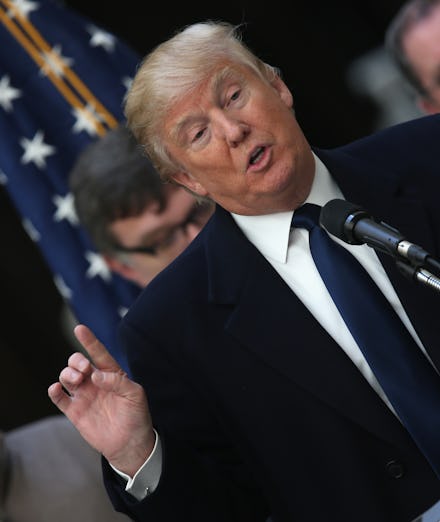Brussels Terror Attacks Highlight Weaknesses in Donald Trump's Foreign Policy

Donald Trump dishes out some of the toughest applause lines of the race for the presidency when it comes to fighting terror, improving border control and dealing with the United States' allies and foes around the globe.
When pressed on the details, however, the Republican frontrunner comes up short on specifics.
Terror attacks in Brussels on Tuesday, in which at least 34 people were killed and 230 injured, focused attention on the foreign policy of presidential candidates in the U.S., specifically how they would deal with the spread of the Islamic State, which claimed responsibility for the attacks.
Read more: Here's How the Presidential Candidates Are Reacting to the Brussels Explosions
The bombings highlighted several recent instances in which Trump proved less-than-fluent in foreign policy matters, coming under withering criticism for suggesting the U.S. withdraw from NATO and drawing a blank when pressed for specifics on his plan to defeat ISIS.
NATwho? In an interview on Monday with the editorial board of the Washington Post, Trump suggested reconsidering U.S. spending on NATO, a group which includes Belgium, the target of two bloody attacks on transit centers early Tuesday morning.
The Post reported, in part:
Trump said that U.S. involvement in NATO may need to be significantly diminished in the coming years, breaking with nearly seven decades of consensus in Washington. "We certainly can't afford to do this anymore," he said, adding later, "NATO is costing us a fortune, and yes, we're protecting Europe with NATO, but we're spending a lot of money."
The idea — even before the Brussels tragedy — was met with scorn from Trump's rivals. "Donald's knowledge of the world is very, very limited," Sen. Ted Cruz said in an interview with CNN Monday in response to Trump's comments.
Trump's meeting with Post editors also included a bizarre exchange about his plan to deal with ISIS. Asked if he'd use a "battlefield nuclear weapon to take out ISIS," here's how Trump responded:
I don't want to use, I don't want to start the process of nuclear. Remember the one thing that everybody has said, I'm a counterpuncher. Rubio hit me. Bush hit me. When I said low energy, he's a low-energy individual, he hit me first. I spent, by the way he spent $18 million worth of negative ads on me. That's putting [MUFFLED] ...
The editors pressed him to get back to the ISIS question.
"I'll tell you one thing, this is a very good-looking group of people here," Trump responded. "Could I just go around so I know who the hell I'm talking to?"
The questioning about ISIS begins at 36:37 mark here:
The Post's editorial board also asked Trump about his earlier comments about sending tens of thousands of troops to eradicate terror breeding grounds.
His verbatim response: "I said, well, the generals are saying you'd need because they, what would it take to wipe out ISIS, I said pretty much exactly this, I said the generals, the military is saying you would need 20- to 30,000 troops, but I didn't say that I would send them."
Trump pivoted to say the U.S. shouldn't go it alone: "I would put tremendous pressure on other countries that are over there to use their troops and I'd give them tremendous air supporters and support, because we have to get rid of ISIS, okay, just so — we have to get rid of ISIS."
The billionaire real estate mogul separately specified, "I would knock the hell out of ISIS in some form. I would rather not do it with our troops, you understand that. Very important."
The backlash: Trump's response to the Brussels attacks Tuesday morning during a series of interviews to television morning shows — including a renewed promise to bring back waterboarding as part of interrogations — earned him rebukes from the political and academic worlds.
"Donald Trump right now is validating the cartoonish view that they tell their operatives ... that America is a racist nation, xenophobic, anti-Muslim, and that that's why you must carry out terrorist attacks against them," terror expert Malcolm Nance said on MSNBC, according to Mother Jones. "It's irresponsible and it needs to stop."
Following his sitdown with the Post, Trump delivered a typically hawkish — and, atypically for him, prepared — speech to the American Israel Public Affairs Committee in which he promised nothing short of a total alliance with Israel against Palestinian violence.
Previously, Trump riled critics by saying he'd be "neutral" in the conflict so as to allow him to help broker a peace deal if elected president.
Trump tore into the United Nations as "not a friend of democracy, it's not a friend to freedom, it's not a friend even to the United States of America where, as you know, it has its home. And it surely is not a friend to Israel."
While he has had few specifics on how to address the fallout of Brussels in a domestic and international context, Trump had some select words Tuesday for President Barack Obama, who spoke briefly on the attacks during his historic visit to Cuba.
Then again, you can't say he's kept his overarching plan much of a secret.
March 23, 2016, 11:08 a.m.: This story has been updated.